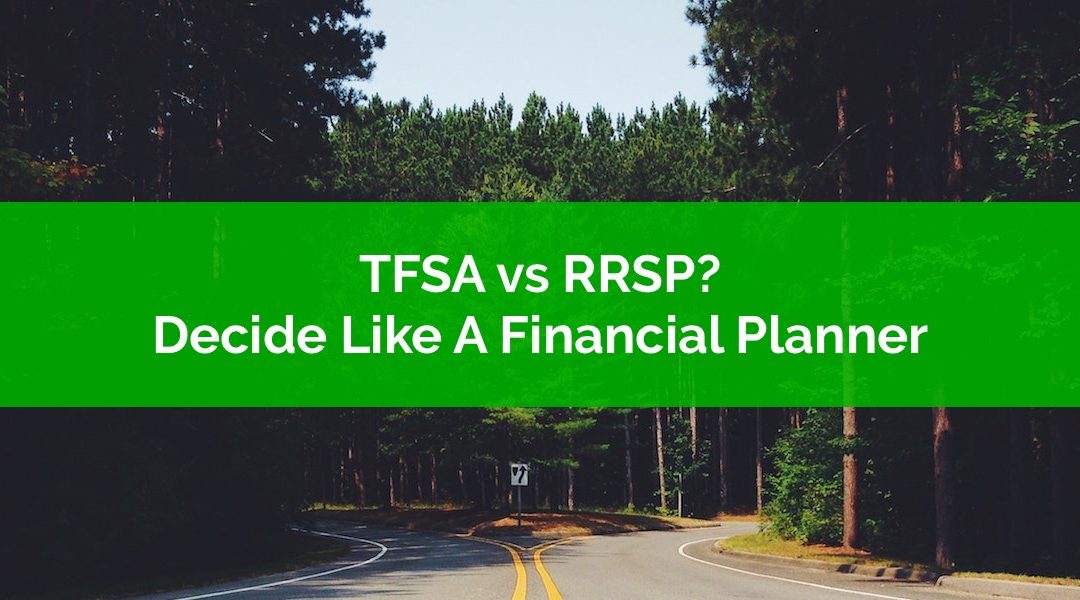
by Owen | Oct 22, 2018 | Financial Planning, Tax Planning
It’s getting to be that time of year again. Time for taxes, time for RRSP contributions, and time to debate whether a TFSA contribution or an RRSP contribution is the best choice.
RRSP season naturally creates this question for many people. Is an RRSP contribution really the right choice? Or would a TFSA contribution be better?
Unless you’re fortunate enough to be maxing out both accounts, the TFSA vs RRSP decision has been an annual conundrum since the introduction of the TFSA in 2009. If you’re not well versed in the differences between the TFSA and the RRSP, read this intro to the TFSA and this intro to the RRSP to get a better sense of the differences.
The TFSA and the RRSP two of the main tax advantaged retirement accounts in Canada. You can use one, the other, or both to save for retirement.
Using the TFSA alone can be enough for a luxurious retirement, one that is 100% free of taxes. However, in certain situations, the RRSP can provide A HUGE benefit by lowering your lifetime tax bill.
Which one you use depends on your situation, and not just your situation now, but also your situation in retirement. To make the decision even more complex there are also some soft benefits that can help push you toward the TFSA or the RRSP when all the other factors are equal.
Deciding between the TFSA or the RRSP can be tough. Making the right decision could be worth $10,000’s to $100,000’s. If you feel like you need help then please reach out to us. We help clients optimize their taxes and benefits, and choosing between the TFSA and the RRSP is an important consideration. A financial plan from a fee-for-service planner can easily save you thousands of dollars and also make these tough financial decisions much easier.
This TFSA vs RRSP guide takes a financial planner’s perspective on the decision between a TFSA and RRSP. Learn how to make the TFSA vs RRSP decision just like a financial planner would. Look at all aspects of the decision, not just taxes, not just government benefits, but everything.
Here’s how to make the TFSA vs RRSP decision like a financial planner. Each factor is important, but the weight you give each one depends on your own situation and goals.

by Owen | Aug 13, 2018 | Financial Planning
Summer time is a great time to read. It’s hot outside, you don’t feel like moving around, you just want to sit and relax. A book is a great way to enjoy those lazy summer days. With vacation days and long weekends there are plenty of opportunities to read a good book. Personal finance books might not be your first choice for a casual summer read but I’ve got three great personal finance books that you should definitely consider this summer.
Of course, there aren’t just three great personal finance books, there are literally hundreds of great books out there. There are books about investing, about financial independence, and about retirement. There are books about budgeting and managing expenses. There are books about how to pay off debt as quickly as possible and how to start saving for the future. There are general personal finance books too, which touch on all these topics and then some.
With so many great books to choose from, and so little time to read them, you need to make some tough decisions. Which book will you put on the top of your list? We have three recommendations that you should consider putting at the top of your list this summer.

by Owen | Jul 16, 2018 | Budgeting, Buying A Home, Financial Planning
Interest rates are going up and that’s putting a squeeze on anyone with debt. Whether it’s a mortgage, student loans, or a line of credit, you’re about to feel the sting of higher rates. We’ve had unprecedentedly low rates for almost 10 years now and forecasters have repeatedly called for higher rates, and it seems that they’re finally right.
The Bank of Canada just increased their rate again making this the 4th increase in the last 12 months. That increase means we’re being charged an extra 1% interest on variable rate debt versus last year. It also means any we’ll be charged an extra 1% on any new fixed rate debt. On a $350,000 mortgage that’s an extra $3,500 per year in interest charges or about $300 per month!
Rising interest rates impact all kinds of financial products. Variable rate mortgages, new fixed rate mortgages, lines of credit, home equity lines of credit and of course, student loans too.
Not only are we paying more for our current debt but rising interest rates also make it more difficult to qualify for a new debt too. Higher rates will decrease the amount of money you’re qualified to borrow. A household earning 80,000 per year will see their home buying budget decrease by $28,000.
There are a few strategies you can use to immunize yourself from the impact of higher rates, at least for a short period of time. From a few months, to a few years, to a decade, these strategies can help you avoid the sting of rising rates.

by Owen | Jan 1, 2018 | Budgeting, Financial Planning
I’m not sure what it is, but I love reading about other peoples’ personal finances.
Maybe it’s because talking about our personal finances is somewhat taboo.
Or maybe it’s because I’m a personal finance geek and I love to see how other people organize their financial life.
Whatever the reason, I love learning about another person’s finances.
Because I know there are other personal finance “voyeurs” our there I thought it would be fun to share a bit myself. In this blog post I’m going to give you a glimpse at my own personal finances and share my family’s budget for 2018.
Three times a year my wife and I sit down and review our financial plan. We go over our investments, our asset allocation, our income and our expenses. We make small changes and tweaks to ensure we stay on track with our overall financial plan. Having a solid budget is an important tool for achieving your financial goals.
So, without further delay, here is my family budget for 2018.

by Owen | Sep 4, 2017 | Financial Planning
Financial stability is so important. Having your finances in order can be a huge stress relief. It lets you focus on the important things in life. Even small financial changes can have a big psychological impact.
Unfortunately, financial stress is the number one stress factor in our lives. This is especially true for young people.
For young people, personal finances cause more stress than family, health, or work. We obsess over our finances weekly, daily, over even hourly.
There are many aspects to consider when building a financially stable life. Things like budgets, emergency funds, maintenance funds, saving rates and debt reduction.
It also takes motivation. You need to have a goal in mind. This provides you with the motivation to make changes to your daily routine.
Building a financially stable life is possible. Any financial situation can be improved. There are just a few things to consider…

by Owen | Jul 31, 2017 | Financial Planning
Where are you in the financial planning life cycle? Are you a student? Single? In a relationship? Do you have a young family? Maybe a growing family? Perhaps you’re entering retirement or maybe you’re starting to consider your legacy for the next generation.
The financial planning life cycle is a quick way to visualize the different financial needs a person will experience throughout their life.
Depending on where you are in the financial planning life cycle your financial needs will change. The financial needs of a university student are vastly different from a new retiree.
Knowing where are you are in the financial planning life cycle will help you anticipate your future financial needs and ensure you’re setting yourself up well for the future.
Knowing where you are in the financial planning life cycle will also help you ensure you’re not skipping anything today.
Page 18 of 19«...1516171819»






